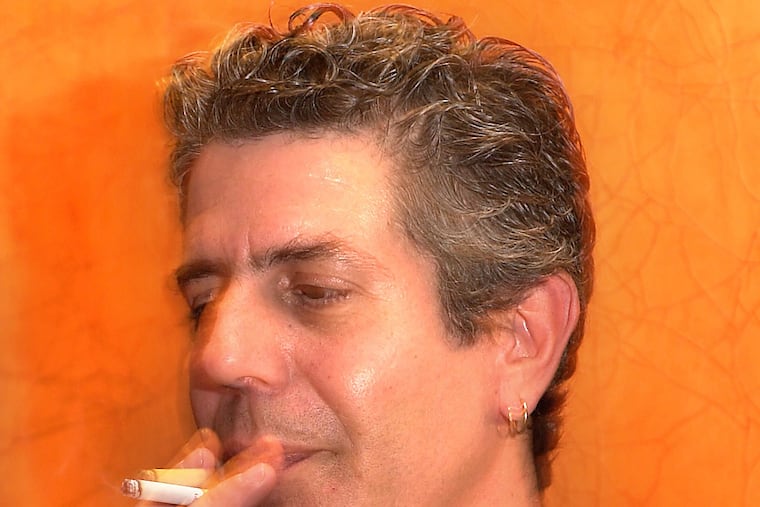Anthony Bourdain: He didn’t set out to be a celebrity
This interview with Anthony Bourdain was originally published on June 6, 2001.

This interview with Anthony Bourdain was originally published in The Philadelphia Inquirer on June 6, 2001.
Anthony Bourdain finishes his margarita, orders another beer, pulls hard on another cigarette, and considers what has happened to him:
He's become one of Them.
Time was, and not too long ago, that he was executive chef at a successful French brasserie in Manhattan, long married, slip-sliding into his mid-40s, with the creaky knees to remind him of it and a modest writing career to get his mind off of it.
In what he calls a "moment of marijuana-induced hubris," he dashed off a short story — a dark and dishy insider's tale of the restaurant business — to the New Yorker, which published it under the headline, "Don't Eat Before Reading This. "
That led to last summer's book Kitchen Confidential: Adventures in the Culinary Underbelly (Bloomsbury, $24.95), a wildly hilarious, raw and glib, two-fistedly unsentimental autobiography.
Which has led to a world tour, during which he's eaten everything — reptile hearts in Vietnam and four-star meals in the Napa Valley — "living my life's dream," he says.
And in the process, Tony Bourdain — a whippet-thin 6-foot-4 who could pass for Jerry Orbach's rakish, much younger brother — has become a celebrity chef: Book tour. TV shows. Free food in other people's restaurants.
Bourdain 's last shift on the line at Les Halles was in August, when he hired a chef de cuisine to run the show. He hopes his staffers — who have been with him for years — understand, though the concept of a chef who has a life outside the restaurant is alien to his being.
"If you're not there before them and leave after them, and if you don't suffer more than they do, they start to lose respect for you," he says.
Not that Bourdain had planned this, or anything else.
"I never figured I'd live past 30," he says at Brasserie Perrier, during a recent stop — yes, the book tour — to plug Kitchen Confidential's emergence in paperback. (Just to shake off the road rust and snap his head back on straight, he asked Brasserie Perrier's executive chef, Chris Scarduzio, for a kitchen tour. )
By his own admission, Bourdain was a snot of a kid who wasted, in more than one sense of the word, two years at Vassar College before an epiphany led him to a life in the kitchen and an education at the Culinary Institute of America. This being a restaurant story, the epiphany involved the realization that the business is a hotbed of sex on the sly. (He watched his boss, a chef, seduce a bride on her wedding day, behind a Cape Cod seafood restaurant. )
From CIA, where he learned from "old-school Euro-geezers," Bourdain knocked around for 25 years, picking up not only culinary skills but an uncanny knack for creating characters, whom he's sprinkled into the book.
"Let's face it," he says, "the book is obnoxious. It's over-testosteroned, it's full of sweeping generalizations. "
But Bourdain 's sweeping generalizations apply everywhere; you say there are no oversexed/starry-eyed/drug-addled/lazy/lying restaurant folk in Philadelphia?
Interspersed with the decadence are tips for diners, such as: Never order fish on a Monday; don't dine out on Saturday nights; and be wary of the Sunday brunch menu.
There's cooking advice, too.
"I wrote it hoping it would be a cult favorite of New York line cooks and chefs," he says, picking the marrow from his osso buco. "I wanted grease-spattered copies to be circulating in kitchens in New York. I didn't think it would travel as far west as Philadelphia, much less Australia and Finland. "
Now, he says, "my heroes call me up out of the blue. … I walk into any restaurant, sit at the bar and order a beer and appetizers, and all the little things start showing up in front of me. "
The cooks – they know. "It's nice knowing you're part of something," he says. "Being a chef is like being a Freemason or a member of the Gambino crime family. We don't have any signs, but there's definitely a shared worldview. We're very aware of our difference from normal people. It takes a certain kind of marginal character to love this. "
And he does love this. His next project is called A Chef's Tour, a book and companion series shot by the Food Network.
Bourdain began his tour in Japan and moved on to Vietnam and Cambodia. He also ate his way through France, Spain and Russia, stopping in good restaurants, at street stalls and in people's homes. "When you want fresh food in the Third World, something dies in front of you," he says.
Eating around the world has reinforced Bourdain 's disdain for American culinary habits and has heightened his awareness of the politics of food.
The glib chef gets serious: "We're a lazy, convenience-oriented culture since World War II. It's, 'OK, I'll eat the chicken breast. I don't have to figure out what to do with the leg.' … We want to pull up in the car, shovel in some food, and if we're hungry later, we'll get a tube of Pringles. We're a bloated, lazy culture that hasn't ever been forced to improvise because of necessity. "
Let's say Kitchen Confidential had not come along. Bourdain turns 45 this month. Could he imagine banging out dinners, six shifts a week, forever?
"Age gets to you sooner or later," Bourdain says. "I don't know what happens to old chefs. They're like young pigeons. You don't see them. I guess I'd be some kind of hustler. I'd be hustling something.
"But the life span of a hustler is shorter than one of a chef. "